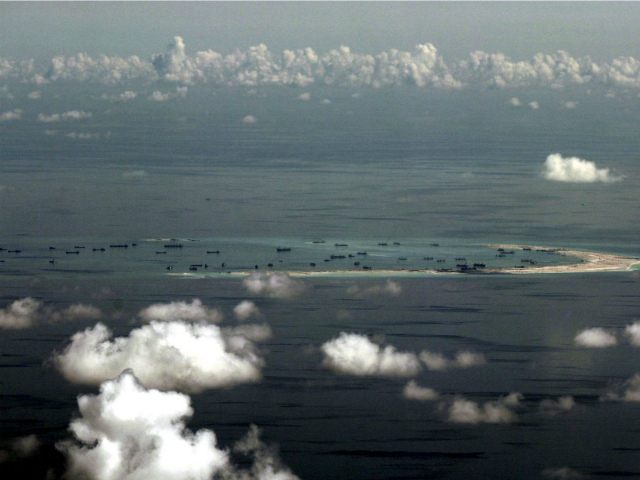Philippines President Rodrigo Duterte walked back concerns about China’s presence in an undisputed Philippine South China Sea territory on Monday, calling reports of tension “exaggerated” while demanding the navy “tell them straight that this is ours” by constructing new “structures” meant to ward off Chinese territorial challenges.
The Chinese government sent a survey ship to navigate the Benham Rise, described as an “underwater land mass” and “biodiversity hot spot” near the Philippines’ Luzon that the United Nations determined was exclusively Philippine territory in 2012. During a regular press briefing Friday, Chinese Foreign Ministry spokesman Geng Shuang told reporters the ship had entered the region for “marine research” and that it was not the first time such an incident occurred. Geng also claimed China had sent the ships there to “exercise navigation freedoms,” a reason China has repeatedly deemed illegitimate when used to explain the presence of American ships in the South China Sea.
According to Defense Secretary Delfin Lorenzana, Duterte himself expressed enough concern with the Chinese’s ships presence in the region that he approved new naval patrols around Benham Rise in addition to “structures” to claim the territory. “We are concerned, they have no business going there,” Lorenzana said on Sunday. He also told reporters that he expected the topic to surface at a National Security Council meeting on Monday.
Geng dismissed Lorenzana’s concerns as the ravings of “some individual,” instead highlighting the blossoming diplomatic relationship between the two countries.
Duterte himself appeared to agree with Geng’s tone while approving actions more in line with Lorenzana’s. “You go there and tell them straight that this is ours,” Duterte said he told Lorenzana, “But I say it in friendship.” He confirmed he had approved of new constructions in the region to make the sovereignty point.
Duterte also asserted that he had no reason to believe China would lay claim to the Benham Rise, which it had not previously claimed. “They’ll not do it at this time,” Duterte said. “America wants to be the fighter, the disorderly ones putting ships there.”
“Why would I want to fight? I cannot match the might of China. Have you seen how they are prepared to fight terrorism?” Duterte asked.
While insisting he would not challenge China, Duterte, nonetheless, appears to be preparing for a confrontation. The Philippine Coast Guard (PCG) confirmed Monday that it had been assigned patrols near Benham Rise. The PCG also confirmed, however, that it would be engaging in joint maritime exercises with the Chinese Coast Guard, a first for both parties.
At the daily briefing Friday, Chinese spokesman Geng insisted, however, that the Philippines’ unchallenged claim over the Benham Rise “does not mean that the Philippines can take it as its own territory,” raising questions about whether China views the territory as inherent to the Philippines.
Duterte’s “structures” would not be the first such challenge to China in the region. The Communist government of Vietnam has also reportedly begun building artificial islands and installing military assets near the Spratly Islands, a Vietnamese island chain China claims. Vietnam’s constructions, according to the Center for Strategic and International Studies (CSIS), appear significantly smaller than China’s in the same area.
China claims almost the entire South China Sea, including parts of the sovereign territories of Vietnam, Malaysia, Brunei, the Philippines, and Taiwan. As China does not respect Taiwan’s sovereignty, Beijing has repeatedly used Taiwan’s claims as proof the region belongs to China.
Most countries involved in this dispute are members of the Association of Southeast Asian Nations (ASEAN); the Philippines currently holds the presidency of the regional group, leaving many to wonder whether Manila will use its influence to challenge China’s claims. While Duterte has insisted on friendly relations with China, polls appear to show that Philippine citizens do not trust China. Eighty-four percent of respondents in a January Pulse Asia poll said they supported challenging Beijing in the South China Sea. The poll also found that China’s two largest rival states, Japan and the United States, are the most trusted foreign countries in the Philippines.

COMMENTS
Please let us know if you're having issues with commenting.